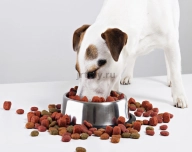The top three mistakes when converting your dog to home-cooked food
The top three mistakes when converting your dog to home-cooked food
Among the most common reasons for converting a dog to home-cooked food, the first places are owners' distrust of the food industry, a desire to use or, conversely, to avoid using certain foods and meeting the special needs of a sick animal. This is at the level of reasonableness, so to speak. But more often than not, people are driven by the belief that homemade food is better and cheaper than prepared food.

If one is serious about making a dog's diet, the reality is far from what the owner expects. Homemade food, even without the time to prepare it, is much more expensive than most quality foods. That said, it's almost impossible to find solid evidence that such nutrition has serious advantages over commercial diets - certainly when considered in the context of the health or quality of life of pet dogs.
It's traditionally a very difficult topic to talk about. Nutritionists point out that the belief of the vast majority of owners is based not on sound reasoning or scientific evidence, but emotional "Here's mine..." or "Here's the neighbor's...". Still, home-cooked meals are not evil.
While it would be wrong to insist that we give it up once and for all, it is important to realize that creating a complete, properly balanced home diet for dogs is proving to be very difficult. In doing so, many owners make mistakes that lead to serious failures in nutritional quality. Which ones? Setting aside nuances like "buckwheat is good, but herringbone is bad," nutritionists say there are three global mistakes.
Mistake one: Using a recipe from an untested or accidental source
To be able to consider homemade food as a serious competitor to ready-made commercial feed, you have to be very careful about its formulation. If you spend a couple of days researching information from the most available sources, it becomes obvious that many of the published recipes are hopelessly outdated. They are excerpts from books almost a century old, and their nutritional value and adequacy to modern realities leave much to be desired.Just how serious the problem is evidenced by a study conducted by veterinary nutritionists at Tufts University's Obesity Clinic. After carefully reviewing about two hundred openly available homemade dog food recipes, they found that only nine met the minimum nutrient requirements for commercial dog foods. Think about it: less than 5 percent of the most popular recipes are adequate!
How do you weed out the most controversial recipes? Dietitians advise avoiding those where the authors allow some ingredients to be substituted for others that are drastically different in nutrients and calories, such as "take two cups of chicken, beef or lamb," do not include vitamin and mineral supplements or make vague recommendations for them, such as "add one tablet of human multivitamins."
Mistake two: substituting ingredients for a tried and true balanced recipe
This is perhaps the biggest problem facing veterinary nutritionists. A recipe can be as good as it gets, but without precise execution, it just becomes a splash. Imagine this: experts carefully select ingredients to give dogs the best of everything possible and ensure their full development. Is it good? Sure. Exactly until the owner decides, for example, to put chicken heads instead of fish, replace buckwheat with pearl barley and completely throw out the carrots and beets.According to a survey conducted by the specialists of a company that develops dog nutrition at home, very few owners follow the experts' recommendations. A few months after the consultation, only 13 percent of owners were still preparing their dogs' food according to the original, nutritionally balanced recipe. Remarkably, when owners were asked if they had made any adjustments to the original recipe, 62% said no, even though the actual changes were evident.
And that's no small thing. The reason why it's critical to follow a scientifically developed recipe exactly is that each ingredient and how it's prepared is critical to the unique nutrient profile of a home-cooked diet. Nutrition experts emphasize: Substituting ingredients, even minor ones, can drastically alter the nutritional profile of a diet and lead to important nutrient deficiencies.
Mistake three: Transferring pregnant or nursing adult dogs and growing puppies to homemade food
Active growth, pregnancy, and breastfeeding of puppies are the most resource-sensitive periods of a dog's life. Nutritionists emphasize that nutritional deficiencies during these periods will inevitably lead to severe and often irreparable damage to health.But it's not just about deficiencies. Even carefully formulated diets do not take nutrient compatibility problems into account, so certain problems can also arise when feeding sufficiently balanced homemade foods. Given the higher need for many nutrients and tighter margins of error, aware of the potential risk of irreparable consequences, nutritionists strongly advise against feeding pet food to growing, pregnant or lactating animals.
Feed your dogs properly.



